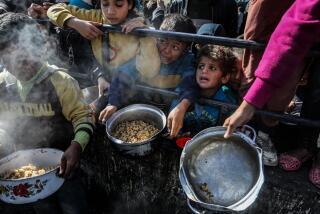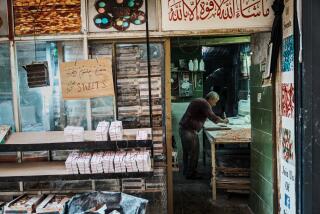Of Caftans and Other Crises in the Casbah
- Share via
In Fez, the medina (old town) is so intricate a spider web of narrow passages that any tourist who ventures into it unguided will be hopelessly lost.
Our tour guide had enlisted the assistance of a local guide and warned us not to get one corner behind the group. He introduced us to a sharp-eyed Moroccan boy of about 15.
“This boy is a mute,” he said. “If you get lost, stay where you are. The boy will retrace our steps and find you. When you get off the bus he will photograph your faces with his eyes and put you in his computer.”
I had it well in mind that once we had been swallowed up in that maze of alleys, none parallel, none perpendicular, we would never by ourselves find our way outside the walls again. It was unnerving. I imagined myself wandering endlessly in the casbah, babbling idiotically. The Lost American.
We walked down one street after another, giving way to old men, women with burdens on their heads, donkeys so weighed down with tiles, goatskins, wool, firewood and other impedimenta that it was almost impossible to get out of their way. Mercifully, there were no cars. The streets were too narrow. Through open doors we looked into dark chambers where men were sewing garments, hammering out shoes, baking bread. Some evidently were private living quarters. We passed mosques in which we could see the backs and bare feet of Muslims at their prayers.
We were led to a quarter where most of the shops sold gold. The proprietors made no attempt to solicit business in the street. They simply sat in their tiny shops, looking like Sydney Greenstreet.
The medina had been relatively free of street peddlers, but not so in the gold quarter. A beautiful youth with a fine mustache and eloquent dark eyes fixed on my wife. I think he saw a vulnerability in her eyes.
She bought a caftan and told him that was it. She was through. He would vanish only to materialize by her side at the next corner. She was his mark. Before we could escape, she had bought three caftans and five bracelets from him.
He vanished again. “Now where is he when I need him?” she said. She had decided she needed another caftan.
“He’ll be back,” I told her.
Like a genie, he reappeared.
I bought nothing. I am immune to street hustlers. Rug merchants are something else; we bought three rugs. But that is another story. Perhaps I will tell it when the rugs have arrived at our doorstep and we lay them down and are reassured that they are not schlock.
Suddenly I saw the mute boy standing at the next corner. His eyes were fixed on us. I couldn’t see anyone else from our group. My wife’s haggling had got us into grave danger.
“Let’s get out of here,” I said, “or we’re doomed.”
The boy turned, silently, and led us to our group.
Later our bus stopped on the road for what our tour guide called a “hydraulic stop.” Always he told us where the toilets were, but he added that if we used them, we would be expected to patronize the bar. It seemed to me that patronizing the bar would only necessitate another hydraulic stop farther on.
Around the corner from the bar we saw several people sitting down along an arcade that led into a building. It appeared to be a medical clinic.
A robed man came out carrying a frail old woman--evidently his mother. He sat down on the sidewalk against the building and put her head in his lap. He looked out at the street with eyes full of sorrow and acceptance. I don’t know how I knew it, but I knew the woman was dying. Her face was small and white and remarkably unlined. Two women in robes knelt and kissed her.
My wife was weeping. We moved on. In the bus she dried her eyes.
“I can’t help it,” she said. “They say these men are macho. Did you see the look of tenderness he gave that woman?”
On the ferry going back across the Strait of Gibraltar I went into the first-class lounge to rest. A television set was on, and suddenly President Reagan appeared. My ears perked up. Maybe he would say something about the Wall Street crash.
“First,” the President said. Then he switched to Spanish.
I would be glad to get home, where the President spoke in English.
More to Read
Sign up for The Wild
We’ll help you find the best places to hike, bike and run, as well as the perfect silent spots for meditation and yoga.
You may occasionally receive promotional content from the Los Angeles Times.






